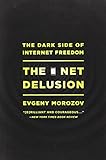> In conclusion, one doesn’t have to wear a tinfoil hat to understand that these solutions will swing both ways. And some are going to get hurt. To all those who think smart-cities will liberate humanity from repressive regimes, please think again.
For a deeper perspective on this point, I'd highly recommend reading "The Net Delusion" by Evgeny Morozov [1]. He focuses on the moral/ethical/political/sociological aspects of modern technological change and systems that other optimistic authors intentionally fail to cover.
> Smart cities implemented over complex self serving bureaucratic processes can become an electronic manifestation of stupidity written in code.
This sentence immediately reminded me of Kafka's "The Castle."
The future could be either empowering or oppressive, or both to some degree, depending largely on how we legislatively control the technological systems we're building.
[1] https://www.amazon.com/Net-Delusion-Dark-Internet-Freedom/dp...
Hmm. But isn't the internet/new media heavily balanced towards the 1-way communication model ? Does sharing, re-sharing and commenting in the void qualify as 2-way or m2m or is it just an amplifier ? The potential is here but does it really solidify into existence for the vast majority or is just for the vocal groups (NGO, journalists, lobbyists, etc.) ?
I have in mind the net delusion [0] and the submarine model [1].
[0] https://www.amazon.com/Net-Delusion-Dark-Internet-Freedom/dp... [1] http://paulgraham.com/submarine.html
I think you'll find this book interesting:
https://www.theguardian.com/books/2011/jan/09/net-delusion-m... http://www.nytimes.com/2011/02/06/books/review/Siegel-t.html...
https://www.amazon.com/Net-Delusion-Dark-Internet-Freedom/dp...
> But the internet allows people on the so called fringe to see that they may not be the fringe after all.
Not really, the internet also has that loudest voice syndrom.
> You can say anything online and that widens the scope of what is considered acceptable discourse.
Or you get drowned in an endless sea of information, a dot in the noisegraph.
> Notice how the media tries to black out Trump's insanity but it gets so much attention on social media that they're forced to cover his tweets.
Can't comment on that as I don't live in the US :/ but it's an interesting point. How effecient can they really be at hiding something vs ignoring it.
http://www.amazon.com/Net-Delusion-Dark-Internet-Freedom/dp/...
http://www.guardian.co.uk/books/2011/jan/09/net-delusion-mor...
https://www.nytimes.com/2011/02/06/books/review/Siegel-t.htm...
One of the clearest lessons learned is that once these things take root, they are incredibly hard to dislodge. When they do go, it's only due to truly cataclysmic change. What naive Americans may regard as absurd hyper-sensitivity or a hopeless lack of technical sophistication is often an acute awareness that never letting it happen again means banning a lot of stuff that young innocents casually dismiss "as just being how the internet works".
Evgeny Morozov (author of "The Net Delusion" http://amzn.to/nOOxzQ) observes that casual openness is exactly how the web can be used to work against you. He makes the point that while folks safely ensconced in California should be grateful for their freedom from truly abusive government, they should also be a lot more sensitive to the concerns - and outright trauma - still found in places that haven't been so lucky.
Of course, I'm over-simplifying his argument a bit. If you want a more complete (and much more entertaining) introduction, RSA did an especially good animation of a talk he gave, which you can see here: http://www.youtube.com/watch?v=Uk8x3V-sUgU
I can't summarise it anywhere as well as this link can:
http://www.amazon.com/Net-Delusion-Dark-Internet-Freedom/dp/...
If you believe that technology is inherently ethically neutral or that the use of social networks will necessarily produce a net-increase in democracy or freedom, perhaps it's worth reading for some balance.
Don't read everything you believe.
I had to unfollow a bunch of people on Twitter because they kept posting articles and blogs about how technology was being used to "help the plight of the Egyptians". You know, rather than articles about the plight itself.


A lot of people believe so and unfortunately some policy-makers as well. I thought the book https://www.amazon.com/Net-Delusion-Dark-Internet-Freedom/dp... made a good argument against cyber-utopianism.